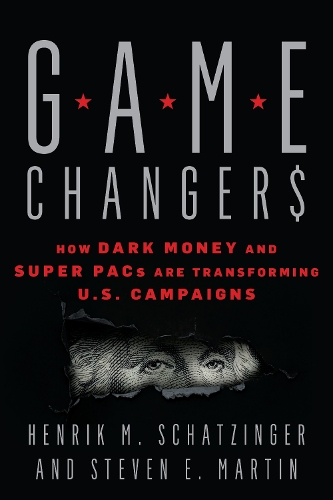
Game Changers: How Dark Money and Super PACs Are Transforming U.S. Campaigns
(Paperback)
Publishing Details
Game Changers: How Dark Money and Super PACs Are Transforming U.S. Campaigns
By (Author) Henrik M. Schatzinger
By (author) Steven E. Martin
Bloomsbury Publishing PLC
Rowman & Littlefield Publishers
13th February 2020
United States
Classifications
Tertiary Education
Non Fiction
Political campaigning and advertising
Political parties and party platforms
324.780973
Physical Properties
Paperback
252
Width 153mm, Height 226mm, Spine 15mm
336g
Description
The first book of its kind to provide an accessible overview of the changes Citizens United brought to political campaigns and political representation, it combines rigorous academic research with many examples of ongoing trends from the campaign trail. Even though campaign finance involves complex legal issues, the book is set up to be engaging for both students of political campaigns and American politics, as well as civically engaged citizens who want to learn more about outside groups and their impact on campaigns and public policy.
The book makes the case that Super PACs and dark money groups qualify as game changers of political campaigns not only because of what these groups can do independently from candidates and their increasing ability to match or even exceed candidates financial resources, but because their actions influence the political incentives and strategies of candidates and political parties. We also point out evidence that those changes go beyond campaignsthey affect how legislators represent their constituents; how donors put pressure on lawmakers to adopt certain legislation after outside groups supported them; how the regulatory environment can benefit donors as a result of actions taken by federal agencies to repeal or dismantle existing laws; and how extreme positions by politicians can be incentivized and progress stalled when megadonors and outside groups reward political ideologues.
Our hope is that this text inspires readers to draw their own conclusions about the effects the U.S. Supreme Courts Citizens United decision has had and continues to have on the inner workings of American democracy. Some may even feel moved to take action that will empower ordinary citizens who want to have more of a voice in the democratic process. Given the high stakes associated with elections and the political changes they can bring due to the highly polarized political environment we live in, we believe that this book will add value to not only courses focusing on campaigns, elections, interest groups, and political communication, but also other courses such as introductory American Government courses.
Reviews
The complex and changing rules of campaign finance in the United States demand books like Game Changers provide clear explanations for a broad audience of readers. The book delivers on this challenge with timely, readable, and expert analysis of the ways money and politics interact, as well as a sober assessment of an array of democratic reforms. -- Heath Brown, John Jay College
The financing of political campaigns has changed in bewildering ways in the past decade. Game Changers is an essential guide to making sense of these changes. Schatzinger and Martin show how candidates, parties, groups, and donors have adapted to the world of Super PACs, and they carefully consider how future reforms might work. This book is essential reading for anyone concerned with the role of money in politics. -- Robert G. Boatright, Clark University
Students and citizens want to understand the role of money in politics. But the rules and strategies keep changing. Game Changers offers the updated answers to today's most important campaign finance questions, with a close eye on recent changes and their implications for democracy. -- Matt Grossmann, Michigan State University
Author Bio
Henrik M. Schatzinger is associate professor and chair of politics and government at Ripon College, where he teaches and conducts research on interest groups and money in politics. He is also codirector of the Center for Politics and the People at Ripon College, which organizes numerous events to promote constructive political debate. Schatzingers research has examined the timing of campaign contributions and as a research analyst for the Campaign Finance Institute (20089), he has examined how democracy can be strengthened through small donors and volunteers. A new article coauthored by Schatzinger on lobbying for federal contracts is forthcoming in Social Science Quarterly. Schatzinger is teaching courses on campaigns and elections, interest groups, and money in politics.
Steven E. Martin is professor of communication and chair of the department at Ripon College, in Ripon, WI. He has published book chapters and articles about Wisconsin Governor Scott Walkers discourse about public unions, the labor movements use of visual rhetoric as counter-propaganda, and the controversies surrounding NFL players decisions to kneel during the national anthem. He teaches courses on the First Amendment, political campaign communication, American public address, environmental communication, media and society, and public speaking. He holds degrees from Colorado State University (M.A.) and The Pennsylvania State University (Ph.D.).
